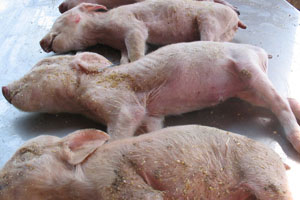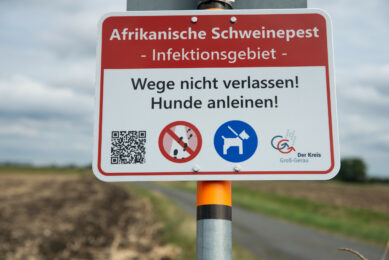Disinfectants effective against PEDv

Neogen Corporation announced that independent laboratory results have shown two of its agricultural disinfectants are effective against the deadly Porcine Epidemic Diarrhoea virus (PEDv).
The independent study showed that Neogen’s DC&R Disinfectant and BioSentry BioPhene Disinfectant demonstrated “complete inactivation” of the PEDv organism when tested in accordance with current Good Laboratory Practice protocols commonly used to evaluate disinfectants. The study’s test results meet the US Environmental Protection Agency’s (EPA) criteria for a virucidal label claim; the label claim is now pending the agency’s approval.
“While the results were expected, the independent validation of the efficacy shown by our disinfectants to kill, or inactivate, the porcine epidemic diarrhea virus should further strengthen producers’ confidence in their use against the virus,” said Terri Morrical, Neogen’s vice president of Animal Safety. “It is estimated that seven million baby pigs have been lost to the virus in the US in the past year. This validation of the effectiveness comes at a critical time for the swine industry.”
PEDv can devastate a population of nursing pigs, with mortality approaching 100%, and can significantly impact the performance of adult pigs. The virus is not transmissible to humans and does not affect food safety. However, it is estimated the disease will cut pork production as much as 7%. This reduction is already becoming evident in the retail meat counter.
Neogen’s disinfectants shown to be effective against PEDv:
• DC&R Disinfectant, EPA Reg. No. 61282-59, is a unique vapor phase disinfectant with a neutral pH, and is non-corrosive.
• BioSentry BioPhene Disinfectant, EPA Reg. No. 61282-53, is a phenolic derivative disinfectant that is effective on hard surfaces, and other areas where organic load may be an issue in and around farm premises.
PEDv was first reported in the United Kingdom in 1971, and has since been found in the several other countries in Europe and Asia. The first confirmed case of PEDv in Canada was reported in January 2014. Pigs infected with PEDv, which is transmitted through a fecal-oral route or via fomites in the pigs’ environment (e.g., boots, brushes, buckets, etc.), may show varying symptoms, including diarrhoea, vomiting and dehydration. Recovery, when possible, can take a week to 10 days.











